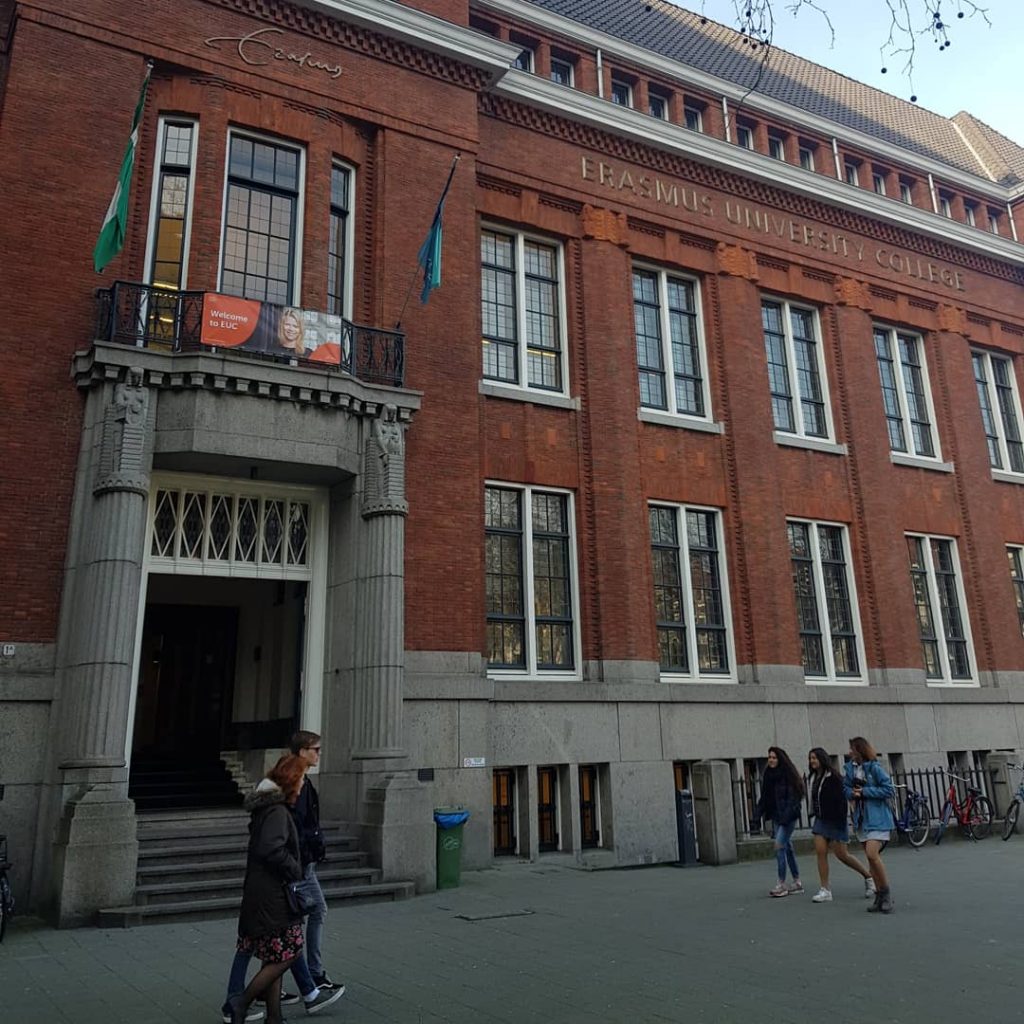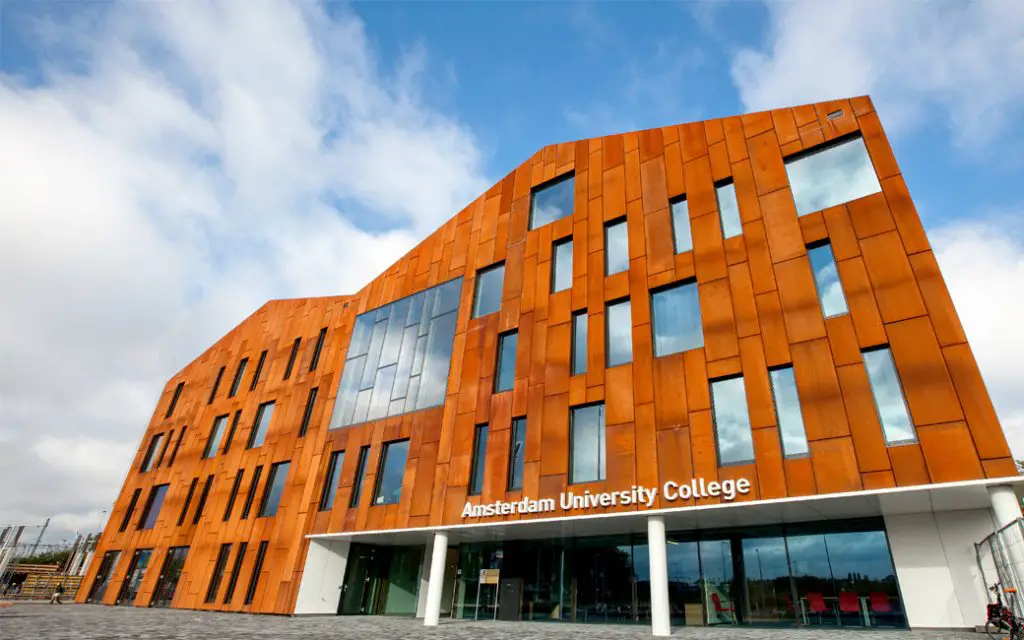Study at Sciences Po
A prestigious French institution with an impressive political and intellectual standing

The Paris Institute of Political Studies (Institut d’études politiques de Paris), commonly referred to as Sciences Po, is a higher education institution in France.
An impressive institution with a palpable political standing, it was founded in 1872 in order to promote a new class of French politicians in the aftermath of the French defeat in the Franco-Prussian War.
Since then, it has educated 32 heads of state or government, 7 of the past 8 French Presidents, 3 past heads of the International Monetary Fund, heads of international organizations (including the UN, UNESCO, WTO, IMF, EP and ECB), and 6 of sitting CAC 40 CEOs. Sciences Po has expanded greatly since that time, and now has additional campuses in Dijon, Le Havre, Menton, Nancy, Poitiers, and Reims.

Academic matters
An extremely prestigious institution, Sciences Po ranked 3rd in the world for politics and international studies in 2019, just below Oxford and Harvard. In 2020, it was ranked 242th (7th in France) by QS World University Rankings, and 401-500th in the world (19th in France) by Times Higher Education.
In terms of course structure, the Sciences Po Undergraduate College offers a 3-year Bachelor of Arts degree with a multidisciplinary foundation in the humanities and social sciences with emphasis on civic, linguistic, artistic, and digital training.
On all campuses, students choose a multidisciplinary major, be it Politics & Government, Economies & Societies, or Political Humanities. What’s more, each campus offers a different regional concentration: North America and Africa (Reims), Asia (Havre), Europe (Dijon), Latin America, Spain and Portugal (Poitiers), Middle East-Mediterranean (Menton), and Europe and the Franco-German region (Nancy).
Interestingly, Sciences Po offers dual bachelor’s degrees with Columbia University, Keio University (Japan), University College London, Freie Universität Berlin, University of British Columbia, the University of Sydney, the National University of Singapore, the University of Hong Kong, and the University of California Berkeley. To qualify, students must simultaneously apply to both schools. For more information about dual degrees, see here.
At the graduate level, Sciences Po’s 7 schools offer 1 and 2-year Master’s programmes and PhD programmes. All graduate courses are delivered on the Sciences Po campus in Paris. Sciences Po also hosts dual Master’s programmes with international partners. Students pursuing dual degrees programmes spend 1 year at Sciences Po in Paris and 1 year at the partner university.
Research is also a large part of Sciences Po’s reputation, with an academic community of over 200 researchers and 350 PhD students. Topics covered include history, economics, law, sociology and political science, whilst also incorporating many interdisciplinary topics such as cities, sustainable development, political ecology, globalization and socio-economics.
Student Life
Social and extra-curricular life at Sciences Po is diverse and vibrant. There are over 200 different clubs and societies, all run by students. They range from politics and international relations to charity work. For instance, the society ‘Politiqu’elles’ works to promote gender equality and raise awareness for issues women face in society. Another notable society is ‘Melting Potes’, which helps international students integrate into French society through a buddy system whereby international students are paired with their French peers.
Sciences Po also gets involved in artistic and athletic pursuits. One particularly key event occurs at the end of each academic year. For the event, all of the seven Sciences Po campuses get together for the inter-campus Collegiades de Sciences Po tournament, which is also known as ‘MiniCrit’. Students represent their particular campus and compete against one another in arts (such as singing and dance), and sports competitions (such as football and volleyball). This creates a culture of strong community and healthy competition.
To sum up, if an extremely international and intellectual community appeals to you, Sciences Po may be the perfect place to pursue a degree in Economy & Society, Political Humanities or Politics & Government!!
What is the profile of the students at the Sciences Po?
Because of the high selectivity of the university, we recommend to apply to this university only if you can show excellent academic results and you are sure to obtain a ‘Tres Bien’ grade in the Baccalaureate.
Article written by YOUR DREAM SCHOOL, October 2019

Are you ready to study at Sciences Po?
We’re here to help you.

ESSEC Business School
An internationally renowned school with campuses in Europe and Asia

The Ecole Superieure des Sciences Economiques et Commerciales, known as ESSEC, is a Paris-based Grande École with campuses in France, Singapore and Morocco. It is one of the most selective and prestigious business schools in Europe and together with ESCP and HEC, in France, is referred to as one of the “trois Parisiennes”.
This name puts the three schools into their own separate category as they are considered the best business schools in Paris. Students are admitted via the councours entrance exam at ESSEC and the school has an acceptance rate of just 6% for applicants. Extremely selective, this school is famous for its world-renowned Masters in Management program (MiM) as well as its Bachelor in Business Administration (BBA).

Masters in Management
ESSEC’s flagship Masters in Management program ranks as the 4th best in the entire world, according to QS Top University Guide 2019. The Financial Times, likewise, has the school ranked as high as 3rd worldwide in 3 out of the last 5 years. The MiM program combines the best of a prestigious French ‘Grande École’ experience with a unique exposure to international financial markets through its campuses in Morocco and Singapore. The tri-campus program provides a dual gateway to over 90 partnering business networks in Europe and Asia. Students on the MiM program at ESSEC tend to work 3 days a week at a corporate firm and study for 2 days at the school thanks to the school’s apprentice program. In return, the companies and firms involved will often pay the tuition fees for students at ESSEC.
BBA Program
ESSEC’s BBA program is designed for high-performing candidates that have graduated from secondary school. It lasts a total of 4 years and has been in existence for over 30 years. The BBA program here at ESSEC stands out because it is characterised by exceptional international orientation. Graduated students will have spent at least 1 year working abroad, as well as have spent at least 1 semester in one of ESSEC’s 77 partner universities in 30 different countries around the world. Partnerships with such prestigious universities as McGill in Canada and the Hong Kong University of Science and Technology ensure a wide web of international business networks from which ESSEC students can profit.
Campus Life
Although one school, ESSEC has 3 different campuses in 3 different countries. The France-based campus is located just outside of Paris and 35 minutes from the bustling Parisian business district of La Défense. ESSEC has 2 other campuses in Singapore and Rabat, Morocco, respectively. The tri-campus provides access to 3 important, yet different, business markets and industries around the world. Singapore, with its thriving and innovative technology sector, represents one of the most dynamic and fastest-growing markets in the world.
Morocco is a rising force in the business world and serves as an economic hub, influencing all of West- and Sub-Saharan Africa with its steady growth and powerful culture. With access to such different and diverse financial markets in Africa, Asia, and Europe, ESSEC may be the best internationally connected business school in the world! Its reputation really does speak for itself!
Article written by YOUR DREAM SCHOOL, September 2019
Are you ready to study at ESSEC Paris?
We’re here to help you.

Study at IE Madrid
An international business school in the heart of Madrid

Established in 1973 as the private business school Instituto de Empresa, today IE University (IEU) offers programs entirely in English to its 3,000 undergraduate, graduate, doctoral and executive education students, nearly 70% of whom are international. Its first undergraduate class graduating in 2013, IE University has experienced remarkable success as an institution as it is now a top 50 global university in business & management studies (QS World University Rankings 2016) and No. 1 School worldwide in the QS Distance Online MBA Ranking.
It’s core values of technological immersion, innovation, entrepreneurial mindset, humanities and diversities are truly setting IEU apart as it “Reinvents Higher Education”.

IE Madrid in a few words
IE University has two campuses: Segovia, located a few kilometers from the center of Madrid and the Madrid campus in the financial district (Barrio de Salamanca). Degree programs allow students to experience both campuses.
The IE University campus in the city of Segovia offers an authentic campus experience. It is housed in the Convent of Santa Cruz la Real, a historic building declared a national heritage site in 1931. Segovia is only 25 minutes from Madrid by high-speed train, and welcomes students from over 80 countries in a global university setting, with an atmosphere that is both academic and lively.
The IE University campus is located in the Maria de Molina area or financial center of Madrid, a leading European capital. Our students benefit from a global learning environment, top-tier networking opportunities and buildings equipped with state-of-the-art facilities – all shared with the prestigious top-ranked IE Business School. IE is currently building a brand new campus also in the financial district of Madrid, exclusively for undergraduate students to be completed in 2020.
Starting in 2020, undergraduate students will have a brand new home called “Campus IE” to call their own. Campus IE will form part of the Caleido, an ambitious architectonic complex set to change Madrid’s skyline. The purposeful vertical design of the newest campus respects high standards of sustainability and leaves ample room for large open green spaces open to the city of Madrid and its residents. The future complex will also include an extensive shopping area, restaurants, leisure & sports facilities, art and culture structures.
IEU campus life provides clubs for every interest, whether it be professional, sports, social or geographic. Main events on campus include the IE Winter Ball, a fun event for a social cause; the annual, student-organized TEDxIE Madrid; Global Village celebrating the wealth of cultural diversity on the IE campus; IE LGBT@WORK promoting the free exchange of ideas and a networking platform; and the Social Responsibility Forum an interactive space for graduate students and professionals to share knowledge and generate ideas.
Academic life at IE University
IE University and IE Business School offer university courses that are based on the entrepreneurial character and the practical experience of its students, technological innovation and international mobility.
IE Business School was ranked #3 in Europe by the Financial Times, 2017. According to QS World University Rankings Masters In Business Analytics (#10) and Distance Online MBA Worldwide (#2), 2019.
Offering a full range of Bachelor degrees, at IE you may choose from:
Bachelor of:
- Dual Degree in Law and International Relations (LLBBIR), *bilingual English/Spanish option
- Architecture (BAR)
- Design (BID)
- Business Administration (BBA)
- Communications and Digital Media (BCDM)
- Information Systems Management (BIS)
- Law (LLB)
- Behavioral Sciences (BBS)
- International Relations (BIR)
- Politics, Law & Economics (PLE)
- Dual Degree in Business Administration and Law (BBALLB), *bilingual English/Spanish option
- Dual Degree in Business Administration and International Relations (BBABIR)
A bachelor at IE University is a 4-year degree and dual degree is a 5-year program as is a degree in architectural studies. The business school offers MBA, Executive MBA, master’s degree programs in finance and management, executive education programs, PhD and DBA programs.
IE University offers student and / or faculty exchange programs with other international centers such as AA School of Architecture, Brown University, The University of Arizona, Universidad de los Andes, Instituto Tecnológico de Monterrey, or Politecnico di Milano
How do I apply?
As part of our Admissions Process, IE University requires candidates to take their Admissions Test to measure their competencies, skills and personality characteristics. It also evaluates their English level. Students may also opt to take the ACT, SAT or LNAT in place of IE University’s entrance exam.
Although not mandatory, students may wish to add English scores to their application. Standards as are follows:
- TOEFL: minimum 90, 100 points recommended
- IELTS: minimum 7 points
- Cambridge: CAE (with marks A, B and in some cases C with a strong oral conversation) or CPE
Students wanting more support in English may enroll in a Language Proficiency Track (LPT) their first year to reinforce their English skills.


When do you have to start preparing for IE Madrid?
The deadline to apply for a Bachelor’s at IE University is at the end of your final year.
Always bear in mind the preparation work needed for admission to IE University, it is therefore strongly recommended that you start preparing your application at the start of your final year to maximize your chances of success.
A year of tuition at IE University ranges from just over €20,000 to €24,000 depending on the course. The University offers some Financial aid opportunities, which may cover up to 100% of enrollment fees. Students may apply for IE Loans, IE Scholarships or outside funding and should do so by completing their Financial Aid application.
Are you ready to study at IE Madrid?
We’re here to help you.

Erasmus University College (EUC)
A prestigious Liberal Arts University in Rotterdam

Inclusive. Inspiring. International.
These three words help to describe what EUC is as an institution. EUC, the international undergraduate honours program of Erasmus University Rotterdam, excels academically: #70 worldwide in the 2019 Times Higher Education rankings, and in 2018 was voted the top- rated programme in the Netherlands.
However, the university experience is more than about academia. EUC is a residential program, and from the student residence in the heart of Rotterdam, the Netherlands’ most multicultural city (and 10 minutes walk from the university), students will have the opportunity to make lifelong friendships with people from around the world. EUC is truly an international community: 60% of students did not attend a Dutch secondary school, 32% are EU students, and 18% are non-EU.

Academic matters
Course details
- The 3-year program compromises both breadth and depth
- EUC has an active approach to education, called Problem Based Learning, where students lead and all students participate
- Class size is therefore kept small 12 students per tutorial
- There are 21 majors within four departments to choose from: Economics & Business; Humanities; Life Sciences; Social and Behavioral Sciences; Interdepartmental Majors
For more information, please visit: www.eur.nl/en/education/curriculum
Problem-Based learning (PBL)
PBL is one of the defining learning methods at EUC. In a small group of 10-15 peers, students engage in a dynamic discussion that is facilitated by a tutor, a subject-area expert with an advanced degree. PBL empowers students to contribute and to uncover the areas where their knowledge about a particular topic ends. From there, students do independent research that they then bring back to class next time. This type of active learning is research-proven to increase not only learning but also retention and motivation. In addition to this environment, students may also have larger lectures at Erasmus University.
Student life
Double Degree Arts & Sciences
Another standout feature of EUC is the university college’s dual degree program for those expressing interest and talent in art, music and academics.
EUC has thus partnered with Willem de Kooning Academy and Codarts to offer a double degree mixing Liberal Arts and Sciences with the Arts (music, fine arts, design).
The program is hosted in the Rotterdam Arts & Sciences Lab (RASL) and lasts 5 years.
Students must only pay EUC tuition, but are required to apply to each institution separately.
For more information on the double degree, please visit: www.eur.nl/en/euc/education/double-degree-arts
How do I apply ?
Entry Requirements
- Secondary school diploma (See website for specific requirements per country)
- Grade average of at least 70%
- Demonstrated mathematics proficiency or EUC mathematics test or SAT/ACT
- Proficiency in written and spoken English
For more information, see: https://www.eur.nl/en/euc/application-admissions/admission-requirements
Admissions email: selection@euc.eur.nl
Application deadline
| You want to start at EUC in: | Application deadline: |
| September 2019 | 1 December 2018 |
| 15 April 2019 |


What are the tuition fees for EUC ?
Fees:
Annual fees for 2019-2020:
€ 4,200 (EU/EEA nationals – most EU/EEA nationals will be eligible for a reduced first-year fee of € 2,100)
€12,000 (non-EU/EEA)
Experience Days: February 22, 2019, April 26, 2019.
To register: www.eur.nl/en/euc/meet-us
Virtual tour: bit.ly/virtual_tour_euc_full
Video: https://www.youtube.com/watch?v=dpf994DdqNI (experience day)
Are you ready to study at Sciences Po?
We’re here to help you.

Amsterdam University College
A prestigious Liberal Arts University in Amsterdam

Amsterdam University College (AUC) was founded in 2009 as a joint initiative of two parent universities University of Amsterdam (1632) and the VU University Amsterdam (1880) with a particular focus on the natural sciences. The University has quickly distinguished itself with a strong offering in the sciences. Today it ranks #57 by QS Global University Ranking, 2019 with nearly 900 students, 50% of whom are international.
AUC defines itself as a selective, state-funded liberal arts university along the lines of an American liberal arts college. All programs are taught in English and half of the student body majors in science.

Amsterdam University College in a Few Words
Academics
According to the University, the Liberal Arts & Sciences program will allow you to learn how to “think critically, read intelligently and communicate effectively”. All students begin their career at AUC by taking classes in the Academic Core, which includes philosophy, mathematics & research methods, critical writing & reading, and word languages & logic. From there, students are free to choose a major within the sciences, social sciences or humanities. You can take classes outside your major and even pursue double major.
6 interdisciplinary themes provide an orientation to your studies:
- Energy, Climate and Sustainability
- Life, Evolution, Universe
- Health and Well-being
- Information, Communication, Cognition
- Social Systems
- Cities and Cultures
Students are encouraged to innovate and to apply their classroom knowledge. In its short history, students have already created several successful business ventures including the bicycle-sharing platform CycleSwap (2014), bought by the American company Spinlister; the food sharing app Sharood (2015); the non-profit, educational initiative Right2Education (2016) and many more.
Enrichment opportunities
- Community project
- >study abroad
- international >internships and exchanges
- write an honors thesis
Campus life
An Amsterdam is only about 13 km (9 miles) across, this European capital is easy to get to know and easy to get around, especially by bicycle.
AUC is located in the vibrant borough of Amsterdam East is known for its mix of cultures and economic levels. The campus is housed within Amsterdam Science Park, one of the largest concentrations of sciences in Europe including AUC, world-renowned research institutes and 150 companies of all shapes and sizes.
With so many opportunities, it’s no wonder that half of the student body at Amsterdam University College is international. To contribute to the community feel of this small University, all students live on campus. To help them acclimate, all new students attend AUC Introduction Week getting to know one another and the University before classes begin. During the academic year, all student activities are organized under the umbrella of the Amsterdam University College Student Association (AUCSA). Events include sports tournaments, parties, academic conferences like TEDxAUCollege, Voices of AUC and other student-led initiatives.
How do I apply?
Application
AUC accepts around 20% of applicants. To apply to AUC, your application must include:
The Application
- Complete your personal study plan and self-assessment
- Choose your prospective major: Sciences, Social Sciences or Humanities and complete
- Official transcripts/certified copies of diplomas/most recent grade lists (secondary education)
- Proof of identity (copy of passport/ID card)
- Recent passport-style photograph of yourself
- Find at least two academic recommenders and have their email addresses ready for registration in our confidential online recommendation system.
- Proof of English proficiency: IELTS score of at least 7.0 overall, 7 in each component
- Meet math requirement (depending on major)


When do you have to start preparing for Amsterdam University College?
Taking into account the candidate requirements for Amsterdam University College like taking the IELTS and compiling the application field, we recommend that you start to consider your application to the Netherlands in your final year of school.
What are the tuition fees for Amsterdam University College?
Financing your education at UCU:
A year of tuition and housing (“campus fees”) costs about 10K euros for EU students and just under 17K euros for international students.
| All in EUR, per year | 2018-2019 Dutch & EU/EEA1 | 2018-2019 non EU/EEA |
| Tuition fee | 4,336 | 11,927 |
| Accommodation (approximate)2 | 4,494 | 4,494 |
| Insurance (approximate)3 | 460 | 460 |
| Books (rough estimate) | 350 | 350 |
| Visa/residence permit (approximate) | – | 340 |
| Living expenses (including food – rough estimate) | 4320 | 4320 |
| Total | 13960 | 21891 |
FINANCIAL SUPPORT
AUC has its own independent financial aid called the Stichting AUC Scholarship Fund (ASF). This fun offers aid for talented low-income and minority students.
The University also suggest that students use their Grantfinder website (https://www.studyinholland.nl/scholarships/find-a-scholarship), a Netherlands-based, financial aid search engine, or The Scholarship Portal (https://www.scholarshipportal.com/), for students who want to study in Europe.

Are you ready to study at Amsterdam University College ?
Nous sommes là pour
vous aider



